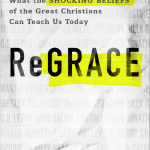There were six things that caused division and strife between Jews and Gentiles. Paul discusses these in Ephesians 2:11-12. These same six things are found in various ways today in our culture and country. As we learn how Paul wanted the Ephesian Christians to respond to these sources of division, we can learn to live at peace with others today as well. All of this is covered in this study of Ephesians 2:11-12.
Before we look at that, however, we consider a question from a reader about the difference between a believer and a disciple.
Question from a Reader
I have read over your page on the difference between a believer and a disciple more than once. Recently I have started reading the Bible again after not reading it systematically for a long time-I tried being a disciple when I was about 18, I went to church for a few years, then I lost faith in God and quit. Now I’m 48 and my faith in God has returned … Your article says that if someone tries to be a disciple and fails then God will teach them, call them etc., so they can become a productive member of God’s family. Are you saying that if someone fails at discipleship, they have to become a disciple again? Or are you saying that God will simply try and make all believers productive in one way or the other?
You often hear pastors and Bible teachers talk about “the path of discipleship.” Thinking of discipleship as a path or a road is a helpful analogy.

I used to live in New York, but I now live in Oregon. When I moved from New York to Oregon, I drove on numerous roads and highways to get here. Now imagine if I stopped driving. I would no longer be making any progress on the road to Oregon. But I also wouldn’t necessarily have to start over in New York. I would just be stuck wherever I was.
At the same time, if I mistakenly or intentionally made a wrong turn, then I might actually be going backwards and headed back to New York, thereby, negating any progress I had made so far. Or maybe I would just be driving around in circles for a while, lost and confused.
But if I followed the map and the directions for getting from New York to Oregon, then I would eventually arrive at my destination. As I did.
This is the way it also works with discipleship. Yes, God wants all believers to become disciples and to make progress on the path of discipleship, and so God has provided in Scripture numerous instructions and directions for how to proceed as a follower of Jesus. If we follow these instructions, then we make progress. However, if we disobey, ignore, or even misunderstand the instructions, then we will stop making progress, and might actually go backwards a bit. But we don’t have to start all over.
And the best part about the path of discipleship is that we don’t have to travel it alone. God has not only given us Himself, Scripture, and the indwelling Holy Spirit to help us on our journey, but also provides us with fellow human travelers to encourage us and aid us on our way. Hopefully, I am someone who is helping you make progress on the path of discipleship as I show you where I have traveled and help you make better sense of the instructions God has provided in the Bible.
The Things that Divide Us (Ephesians 2:11-12)
“It is a part of sinful human nature to build barriers that shut out other people. In New Testament times one of the greatest barriers was between slaves and freemen, especially between slaves and their owners. Those who were free looked down on slaves as being inferior, slightly above animals. Many slaves looked on their masters with contempt and resentment. Consequently, one of the greatest problems of the early church was in getting Christian slave owners and Christian slaves to treat each other as spiritual equals.
“For the most part, women were also looked down on as inferior beings. Husbands often treated their wives little better than they did their slaves. When a wife became a Christian, her entire life, outlook, and value system changed. An unbelieving husband would likely divorce her simply because she had made such a radical decision without his consent.
“The Greeks were so proud of their culture and supposed racial superiority that they considered everyone else to be barbarians, a belief to which Paul alludes in Romans 1:14 and Colossians 3:11. The Greek language was considered to be the language of the gods. The Roman statesman Cicero wrote, ‘As the Greeks say, “All men are divided into two classes, Greeks and barbarians.”[1]
 We must not forget as well, the constant animosity between Jews and Gentiles. From the very beginning with Abraham’s two sons, Ishmael and Isaac, this has been an issue. 4000 years later, the struggle has only become worse with nearly the whole world taking sides between Israel and Palestine and current affairs right now in the Middle East.
We must not forget as well, the constant animosity between Jews and Gentiles. From the very beginning with Abraham’s two sons, Ishmael and Isaac, this has been an issue. 4000 years later, the struggle has only become worse with nearly the whole world taking sides between Israel and Palestine and current affairs right now in the Middle East.
And of course, it is not just the religious, racial, and cultural issues that divide, but also political and scientific issues. Take the current vaccination battle that is being waged around the world. A person’s vaccination status is a great source of division and strife in the world right now. I hope that you are not a person who divides from someone else based on their vaccination status.
All of this division and strife between people is a result of sin. In fact, I argue elsewhere that division is the ultimate Christian heresy. Those who divide from other Christians are guilty of the greatest and most sinful Christian heresy.
But Jesus came to remove all of this division and strife. This is the overall message of Ephesians 2.
Summary of Ephesians 2:1-10
Most Christians think that Ephesians 2 is about how we humans were all sinners and so Jesus came to offer us eternal life. And while that could be a proper reading of Ephesians 2:1-10, that message does not fit with Ephesians 2:11-22. And since Ephesians 2:11-22 is the application section of Ephesians 2, this means that the entire chapter must fit together into one cohesive argument.
And since Ephesians 2:11-22 is all about how the church is supposed to lead the world out of division and strife and into a life of love and unity, this means that the message of Ephesians 2:1-10 is how God revealed to us the true nature of sin, and a better way to life in Jesus Christ.
Up to this point in Ephesians 2, Paul described the normal way of life in this world as one of being dead in our sins and dead to God. We lived in a state of blame, accusation, vengeance, violence, and retaliation (Ephesians 2:1-3). But God then stepped into this situation in Jesus Christ and showed us a whole new way to live (Ephesians 2:4-7). We were raised up to a life in Jesus Christ that is the the life God always wanted for us and which He had planned and prepared for us since the foundation of the world (Ephesians 2:8-10).
In Ephesians 2:11-22, Paul now seeks to show us how to live differently, and also how to lead the world into a different way of living.
Six Sources for Strife (Ephesians 2:11-12)
We’re looking at Ephesians 2:11-12 today, where Paul begins by describing six of the differences between Jews and Gentiles. He describes six of the things that caused strife and division between these two people groups.
All of these damaged relationships are the result of sin. Now if Paul was writing today, he could have written about blacks vs whites, Republicans vs. Democrats, rich vs. poor, police vs. inner city residents, vaccinated vs. unvaccinated, or Christian vs. Muslim.
All of the racial, political, economic, religious, cultural, and health-related division that exist today existed in the days of Paul between Jews and Gentiles. In Ephesians 2:11-12, Paul commands them to remember six things in regard to their human relationships before they were saved. The first of these six is found in Ephesians 2:11.
Ephesians 2:11. Therefore remember that you, once Gentiles in the flesh—who are called Uncircumcision by what is called the Circumcision made in the flesh by hands—
So the first division is that they were Gentiles in the flesh—who are called Uncircumcision by what is called the Circumcision made in the flesh by hands—
Paul is talking here about the differences between the Jew and the Gentile. Prior to Abraham, there was no difference. But God, in choosing Abraham, created a difference. Now God created this difference so that His people could be a blessing to everyone else. The problem, however, was that many Jews saw this difference as a reason to boast and be proud and think that they were superior to the others.
 But God did not choose Abraham so that the Jews would think they were superior to the Gentiles, but so that they might be a blessing and a help to the Gentiles.
But God did not choose Abraham so that the Jews would think they were superior to the Gentiles, but so that they might be a blessing and a help to the Gentiles.
 And the aspect that Paul mentions here in Ephesians 2:11 about this difference between Jew and Gentile is circumcision. Since circumcision was the outward sign of the covenant with God, the Jews considered any uncircumcised male to be outside of God’s blessing and purpose. The Jews were proud of this outward sign of the covenant, and they despised anyone who was not circumcised.
And the aspect that Paul mentions here in Ephesians 2:11 about this difference between Jew and Gentile is circumcision. Since circumcision was the outward sign of the covenant with God, the Jews considered any uncircumcised male to be outside of God’s blessing and purpose. The Jews were proud of this outward sign of the covenant, and they despised anyone who was not circumcised.
In fact, “Jews said that the Gentiles were created by God to be fuel for the fires of Hell; that God loved only Israel of all the nations that he had made; that the best of the serpents crushed, the best of the Gentiles killed.
“It was not lawful to render help to a Gentile woman in childbirth, for that would be to bring another Gentile into the world. The barrier between Jew and Gentile was absolute. If a Jew married a Gentile, the funeral for the Jew was carried out. Such contact with a Gentile was the equivalent of death; even to go into a Gentile house rendered a Jew unclean.”[3]
When a Jew went on a journey and returned, before he stepped back into Israel, he would shake the dust off his feet because he didn’t want to bring Gentile dirt into the holy land.[4]
As we can see—the Jewish people at that time were arrogant, and despised Gentiles. But this was not always the case, and is not the case today either.
In Ephesians 2:11, Paul, although he was a Jew himself, mocks their arrogance by saying that the Jewish circumcision which they took so much pride in was nothing more than something done in the flesh by the hands of men. In Philippians 3:2, Paul calls them “mutilators of the flesh” and in Romans 2:29, he shows us that the real circumcision that God desires is not of the flesh by the hands of men, but of the heart, by the Holy Spirit. It is those who believe in Jesus alone and not in their own works of the flesh that are circumcised of the heart and not of the flesh.
So the first thing Paul wants them to remember is that they were Gentiles—despised by the Jews. The Jewish people thought they were superior to others because they had a covenant with God. They had special revelation. They had better morals. They had a piece of skin cut off their body.
Does any of this sound familiar today? It should.
There are some who think they are superior to others because of how they vote, or because of what religion they belong to, or have more money, fame, or power than others, or because they got a vaccine. And Paul is going to say “Stop dividing over such silly things! All such division is satanic.”
But Paul is not yet done describing the things that cause division. There are five more in Ephesians 2:12. The second is that at that time you were without Christ.
What Paul means is pretty obvious. They did not have Christ. The Ephesians lived under the same problem that the rest of the world live under. They still, just like everyone else, lived under a system of rivalry, violence, scapegoating, blame, slander, accusation, and victimization.
The Ephesians, for the most part, worshipped the goddess Diana, and before the coming of the Gospel, knew nothing of Jesus Christ. They were without Christ, and as such were under condemnation.
Now how did this cause division? Well, the word for Christ here is the Greek Christos, but is the Greek word for Messiah. The Messiah, or Meshiach in Hebrew, is one of the things that caused division between Jews and Gentiles. The Jews has prophecies that the Messiah would come through them. This gave them a sense of superiority over others. But the Gentiles didn’t have a Messiah.
And in fact, many Jews at that time thought that when the Messiah came, He would only be a Savior for the Jews, and everyone else would get destroyed by the Messiah. So yes, the aspect of a promised Messiah caused division.
The third source of division was that Gentiles were aliens from the commonwealth of Israel.
Another way of saying this is that we were excluded from being a part of God’s people, or excluded from citizenship with Israel. They were without citizenship in Israel, and therefore, many Jews thought that God didn’t love or care for Gentiles either. Gentiles were separate from the special blessing, protection, love, covenants, priesthood, sacrifices, promises and guidance that God gave to Israel (Deut 32:9-14; 33:27-29; Isa 63:7-9; Amos 3:2).
 Again, the issue of how to treat people from other countries is a divisive issue today. We currently have a major humanitarian crisis at our southern border, and there is a huge debate about the best way to care for the aliens … the immigrants … who are there. Everybody in our country wants to help the immigrants, but the question is how. Do we just let anyone and everyone come into our country who wants to? Or would it be better to seeks ways to improve the living conditions in the countries they come from so that the immigrants can stay in their home country and gain access to good opportunities there?
Again, the issue of how to treat people from other countries is a divisive issue today. We currently have a major humanitarian crisis at our southern border, and there is a huge debate about the best way to care for the aliens … the immigrants … who are there. Everybody in our country wants to help the immigrants, but the question is how. Do we just let anyone and everyone come into our country who wants to? Or would it be better to seeks ways to improve the living conditions in the countries they come from so that the immigrants can stay in their home country and gain access to good opportunities there?
The issue of citizenship and alien immigrants is a huge divisive issue.
The fourth item from Ephesians 2:12 that causes division is that the Gentiles were strangers from the covenants of promise.
God never made any covenants with Gentile nations. Gentiles were included in the covenant with Abraham, and since Noah lived before Abraham, we could consider him as a Gentile, I suppose, but in broad terms, God did not make covenants with Gentile nations—only with the nation of Israel. Gentiles were considered strangers and aliens—and the Jews never let them forget it.
Many of the Jewish Pharisees would pray daily, “O God, I give thanks that I am a Jew, not a Gentile.”[7]
Why did they have this view? Because God had not made any covenants or promises with Gentile nations. Therefore, Jews believed that God did not love the Gentiles as much as He loved the Jews. Since God did not make any promises to them, this meant that God did not really have any plans for them.
Again, this perspective is sometimes found in various churches, where non-Christians are viewed as second-class humans from a divine perspective. I once spoke with a man who was a strong Calvinist (see my posts here for more about Calvinism) who said that due to his belief in divine election, he never shared the gospel with unbelievers because the Bible said to not cast pearls before swine. That’s an extreme view, even among Calvinists, but it is not uncommon for Christians to rarely interact with non-Christians. It’s not that we hate non-Christians, but we just sort of view them with a disdain and bit if disgust for how they live and what they believe. Once they become Christians, however, then we accept them with open arms … as long as they do what we say and believe what they are told.
You see? Being a stranger from the covenants of promise is a source of division.
Fifth, Gentiles were without hope.
 This, of course, is from a Jewish perspective, for many Gentiles at that time did indeed have hope, just as today, almost everybody has hope of some kind for the future.
This, of course, is from a Jewish perspective, for many Gentiles at that time did indeed have hope, just as today, almost everybody has hope of some kind for the future.
But Jews thought that Gentiles were hopeless. That they had not prospects. No real future. Gentiles were nobodies going nowhere.
Again, sometimes Christians today are guilty of viewing non-Christians in the same light.
And finally, and sort of as a summary of all the others, Gentiles were without God in the world.
The term here in the Greek is atheos from which we get our word “atheist.” Now, the fact that they were atheos doesn’t mean that they didn’t believe in God. Just the opposite in fact. Rather than being atheists the way we think of them today, most Gentiles in Paul’s day were polytheists. They believed in many gods.
Remember Paul’s sermon on Mars Hill in Athens? He talked about all the gods they had. So it was not an issue of them being without gods, it was that they did not know the one true God. They were without the God of the Bible.
But this was a source of contention between Jews and Gentiles. Jews looked down upon Gentiles for not worshipping the One True God, but instead worshipping many false, manmade gods.
And again, a similar strife is often found today between various religious groups. Nearly every religious group looks down upon all the other for worshipping a false god or gods.
So the six things Paul lists here as descriptive of some of the things that caused division and strife between Jews and Gentiles. All six things caused enmity and hatred and discord between Jews and Gentiles.
Why is Paul Reminding the Ephesians Christians Of This?
Paul is not simply trying to remind the Ephesians Christians of how they were once treated and viewed. I believe Paul was writing these things to them, and telling them to remember how they were treated, because the Ephesian Christians were starting to look down upon their non-Christian neighbors and friends with scorn and derision. They had started to feel superior, to feel smarter, to feel like God loved them more than anyone else.
So Paul comes along here and says, “Remember! As Gentiles, you used to be in a position where another group of people looked down upon you, and scorned you, and judged you, and thought that God hated you. You didn’t like that very much. So now that you are part of the family of God, make sure you don’t fall into the same trap. Don’t start treating your non-Christians neighbors the way your Jewish friends once treated you.”
This is a good reminder for us in the church today. Don’t forget your past. If you did not grow up in the church, then you might have had the experience of feeling judged, ridiculed, shamed, or even hated by certain groups of Christians. Some Christians look down upon non-Christians, condemning, criticizing, and accusing them of all sorts of things. Paul would say to you, “Do you remember what that felt like? Now that you are a Christian, make sure you don’t do the same thing.”
You were called to be part of God’s family for the same reason that Abraham was called and the Jewish people were called and all of God’s people are called … not to lord your position over others and think that you are smarter and more blessed than others, but rather to be a blessing and a help to them. To love them.
If you start to treat others with hate and derision, then you are still living in the way described by Paul in Ephesians 2:1-3. We used to live lives of rivalry, blame, accusation, scapegoating, slander, and violence, but now God has called us to live lives of love, forgiveness, grace, faith, and blessing. If we go back to blaming, accusing, scapegoating, and judging the world, then we have learned nothing about Jesus Christ or why He came.
Nevertheless, it is not uncommon for Christians and even pastors to revert back to the old way of living. For example, a certain pastor has said the following: “Scripture teaches … that God eternally hates some men; has immutably decreed their damnation; and has determined to withhold from them Christ, grace, faith, and salvation.”[9]
Here’s a hymn that used to be sung years ago in certain churches around the country: (I don’t know the tune, but the words go …)
“We are the Lord’s elected few,
Let all the rest be damned;
There’s room enough in hell for you,
We won’t have heaven crammed!”[10]
Are you as horrified as I am that certain Christians feel this way about the unsaved? We wonder how the Jews could have hated the Gentiles so, but then we look at some of our own brothers and sisters hating non-Christians in the exact same way!
None of us, I hope, feel this way about any non-Christian. None of us, I hope, despise our neighbor because they are not Christians. Rather, we love them, and are concerned for them, and want to share with them the love that Christ has for them so that they too may be saved. That is the Christians duty. That is our God given responsibility—to bring blessing, not cursing.
In Ephesians 2:13-22, we will begin to see how we can make sure we are a blessing to this world, rather than a source of hate, division, and strife.




 Matthew 12:33-37 (and the parallel passage in Luke 6:43-45) is a key passage for understanding the symbolic use of fruit in Scripture.
Matthew 12:33-37 (and the parallel passage in Luke 6:43-45) is a key passage for understanding the symbolic use of fruit in Scripture.
 The biblical teachings about good and bad fruit don’t even apply to the average person who is generally uniformed or uneducated about what the Bible teaches. Instead, the warnings from Scripture about good and bad fruit primarily apply to those whose job it is to teach others about Scripture and theology.
The biblical teachings about good and bad fruit don’t even apply to the average person who is generally uniformed or uneducated about what the Bible teaches. Instead, the warnings from Scripture about good and bad fruit primarily apply to those whose job it is to teach others about Scripture and theology.




 There are all sorts of ways of getting condemned as a heretic.
There are all sorts of ways of getting condemned as a heretic.
 But what makes the lack of love even more heretical, is that a lack of love often leads religious people to do horrendous and hurtful things “in the name of Jesus,” which makes these actions not just heretical, but satanic and evil.
But what makes the lack of love even more heretical, is that a lack of love often leads religious people to do horrendous and hurtful things “in the name of Jesus,” which makes these actions not just heretical, but satanic and evil.

